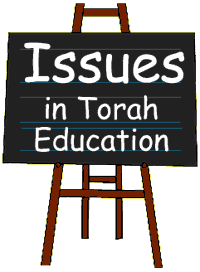

Issues in Torah Education #1
Since this is the first edition of "issues," you'll have to suffer through my "Define Terms" obsession. I sometimes find it useful to know what I'm talking about. Here goes:
Definition #1: "Torah" - now here's a very ambiguous word. The "Torah" could be the scroll you read from in shul, the Law that keeps you from doing the things you want (or makes you feel guilty when you do them), the discipline whose study takes a lifetime, the libraries of thousands of books published over a period of more than three millennia...or all of the above.
For our purposes, "Torah" is "all of the above" - that is, any idea whose source is Tanach (the Old Testament - when studied with its traditional commentaries); Talmud and any of its countless commentaries, ancient and modern; the halachic (legal) literature; or the medrashim (non-halachic homiletic works).
Theoretically, of course, this list should include the kabalistic literature...but alas, I'm from the uninitiated, so we'll have to stumble through without it.
Definition #2: "Torah Education" - Jewish parents and educators share many concerns and goals with all parents and educators. However, those ideas whose source is the "Big World out there" we'll leave to "Big World" discussions: We'll concentrate on the "Torah" part of Torah Education. That's covered by two areas...
...What the Torah offers us. What will a better understanding of the Torah's approach to chinuch (education) do for us. What (if anything) goes through a kid's mind? What will make him tick, sing, study or at least clean his room?
...And what the Torah expects of us: What are we supposed to teach a Jewish child? What kind of curriculum? What moral message? How fast? How deep?
Issues in Torah Education #2
Yes, Passover's almost here. There's plenty to keep us busy. But with all the rush and chaos, it's very easy to forget what's basic: Passover has a message.
It took me years to discover it. It's not that I'd never seen commentaries or heard explanations, it's just that with me it takes a while longer for things to sink in.
I had another problem: The Torah has rules and methods for teaching a child how to observe each of the commandments; how and when to put on tefillin, how and when to study Torah etc.. But where are the rules for teaching Jewish faith? Don't we say "we heard it from our parents who heard it from theirs..."
[Now, of course there's much, much more to our faith than just having heard stories from our parents. Our right to believe (and be proud and confident of our belief) in the G-d of Sinai is rooted in an iron-clad mesorah and bolstered by compelling evidence from many sources. But this isn't the time and place to discuss all that.]So when did we hear it from our parents? Where, when and how does the Torah expect us provide our Jewish children with the tools they'll need to develop their own relationship with G-d? Such an important mitzvah...where's the literature?
Somewhere along the line the light bulb turned on: The Passover seder is the what, when and how of teaching faith (emunah). It's all there; the history ("we were slaves to Pharaoh..."), the miraculous Divine intervention in history (the ten plagues, the exodus from Egypt...) and the revelation of our Torah (the purpose of our national existence).
What? The "course material's" all there ready for us in the Haggada. All we need to do is add the theatrics and enthusiasm.
How? By following the wonderful program left us by our sages. All the classic tools of education are there: capture the child's attention (eg. dipping the karpus), encourage the child to ask on his own (eg. the four questions), physical interaction (eg. spilling of drops of wine) song and rhythm.
Whatever other wonderful things the Passover seder can be: family gatherings, a festive meal, indigestion...when it's all over, there HAS to have been a transmission of faith in the historical reality of our people's coming out Egypt and of their journey to the revelation of our Torah at Mount Sinai.